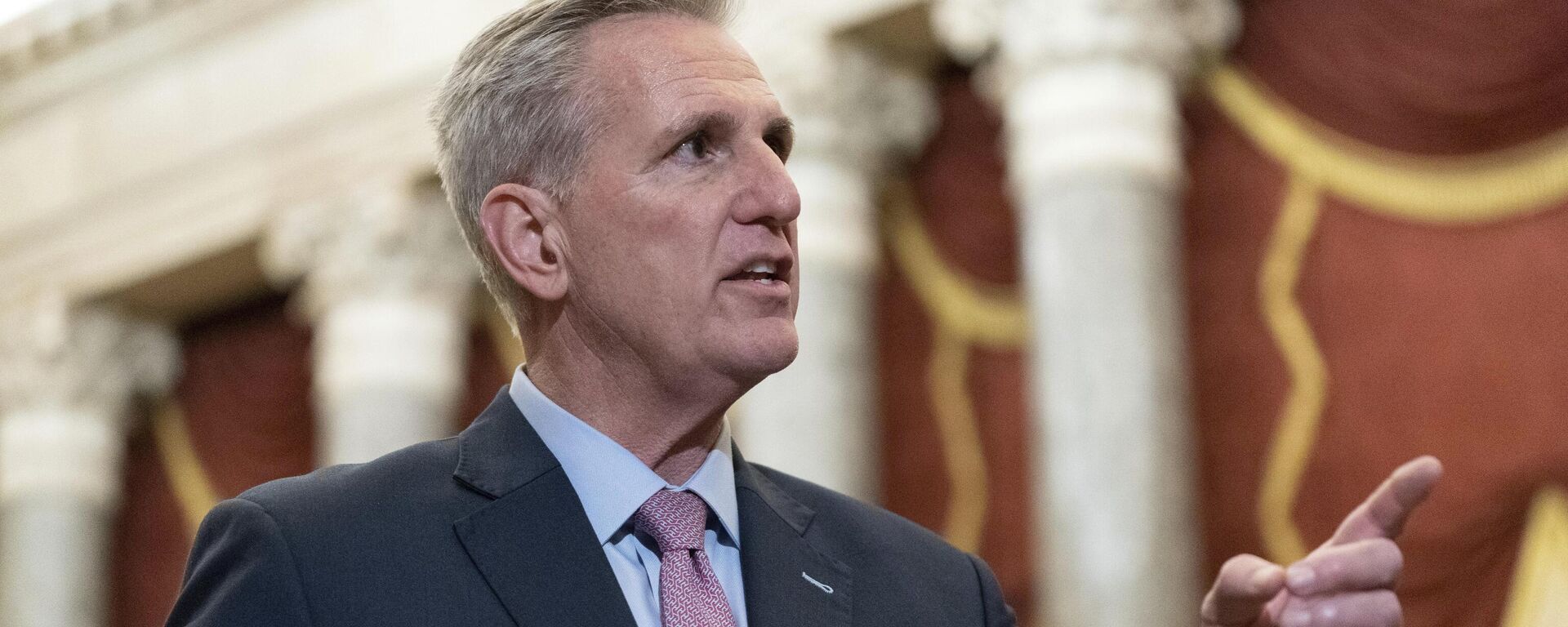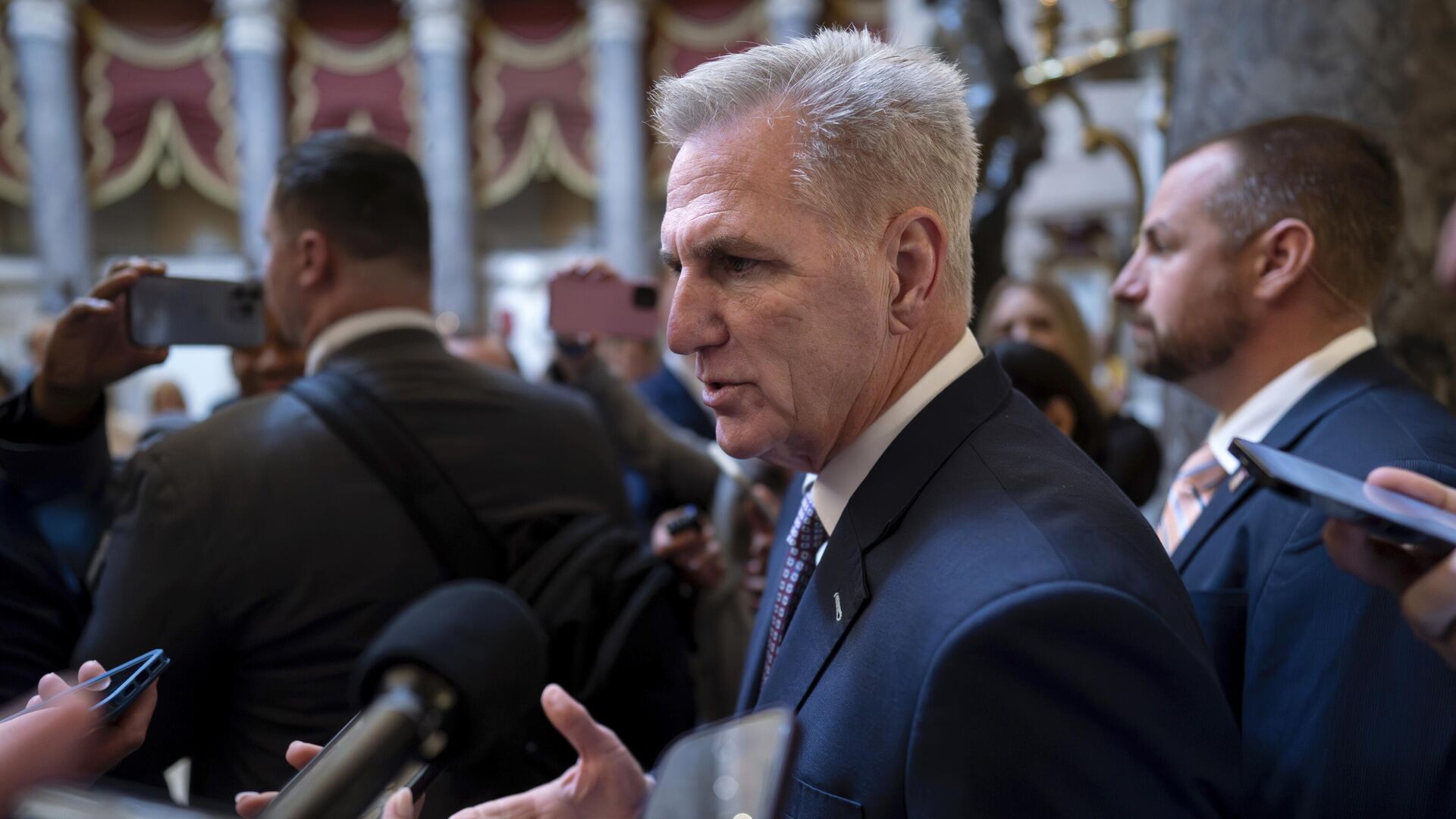https://sputnikglobe.com/20230919/mccarthy-delays-vote-on-advancing-30-day-funding-resolution-as-govt-shutdown-deadline-nears-1113508123.html
McCarthy Delays Vote on Advancing 30-Day Funding Resolution as Gov't Shutdown Deadline Nears
McCarthy Delays Vote on Advancing 30-Day Funding Resolution as Gov't Shutdown Deadline Nears
Sputnik International
House Speaker Kevin McCarthy has postponed a vote on a stopgap spending bill amid his attempts to appease a small but powerful right-wing GOP faction. Only a handful of days remain before the government runs out of money.
2023-09-19T20:07+0000
2023-09-19T20:07+0000
2023-09-29T17:49+0000
americas
kevin mccarthy
house republicans
government shutdown
spending bill
us government shutdown
https://cdn1.img.sputnikglobe.com/img/07e7/09/13/1113507937_0:0:3072:1728_1920x0_80_0_0_b1edc2955178f6deb27bfe9726bf692c.jpg
US House Speaker Kevin McCarthy (R-CA) has postponed a vote on a stopgap spending bill amid his attempts to appease a small but powerful right-wing faction of the Republican Party as a government shutdown looms.The procedural vote originally scheduled for Tuesday afternoon would have approved a 30-day government funding bill, moving it to the Senate and opening the door for wider talks. Some sort of funding bill must be passed by September 26 to avert a shutdown on September 30, but in lieu of agreement on larger appropriations bills, lawmakers have focused on passing a short-term funding bill to give them more time to negotiate.Reports in US media did not indicate when the vote would be held.The most recent legislation, proposed by Republicans over the weekend, would fund the government until October 31 and includes a 1% cut in current spending levels across the entire federal government for that time, with some departments suffering worse than others. However, the dissident Republicans want to press for even deeper cuts, and are demanding more precise numbers on top-line budget items.US Treasury Secretary Janet Yellen took aim at McCarthy on Monday, telling US media the speaker “needs to find a way to do his job.”“Speaker McCarthy needs to find a way to do his job, which is to pass a continuing resolution,” Yellen added.The Treasury chief rarely comments on US domestic politics, but has repeatedly intervened this year to criticize Congress’ bickering over issues that could affect federal finances, including the impending shutdown and the debt ceiling fight earlier this year, in which the federal government came within days of defaulting on its debt.The bitterness of that fight, and its 11th hour resolution, led to Moody’s downgrading of the federal government’s credit rating in August, reflecting a view that lending money to the US government is an increasingly risky move. A previous debt ceiling fight in 2011 triggered a similar reaction by Moody’s, at the time its first-ever downgrading of the US’ credit.Once the short-term funding is agreed upon, lawmakers will still have only a few weeks to agree on a dozen massive appropriations bills that have taken months to assemble, with strong debates raging about how much Republicans can get away with cutting from the budget. While the GOP has a slim majority in the House, the Democrats control the Senate, making negotiation necessary.
https://sputnikglobe.com/20230918/house-republicans-fed-up-with-bidens-ukraine-aid-requests-1113469428.html
https://sputnikglobe.com/20230918/spending-cuts--no-blank-check-for-ukraine-us-house-speakers-bid-to-avoid-govt-shutdown-1113446567.html
americas
Sputnik International
feedback@sputniknews.com
+74956456601
MIA „Rossiya Segodnya“
2023
News
en_EN
Sputnik International
feedback@sputniknews.com
+74956456601
MIA „Rossiya Segodnya“
Sputnik International
feedback@sputniknews.com
+74956456601
MIA „Rossiya Segodnya“
kevin mccarthy; spending resolution; government shutdown; house republicans
kevin mccarthy; spending resolution; government shutdown; house republicans
McCarthy Delays Vote on Advancing 30-Day Funding Resolution as Gov't Shutdown Deadline Nears
20:07 GMT 19.09.2023 (Updated: 17:49 GMT 29.09.2023) Only a handful of days remain before the US government runs out of money and must shut down much of its everyday activities by the end of the month.
US House Speaker Kevin McCarthy (R-CA) has postponed a vote on a stopgap spending bill amid his attempts to appease a small but powerful right-wing faction of the Republican Party as a government shutdown looms.
The procedural vote originally scheduled for Tuesday afternoon would have approved
a 30-day government funding bill, moving it to the Senate and opening the door for wider talks. Some sort of funding bill must be passed by September 26 to
avert a shutdown on September 30, but in lieu of agreement on larger appropriations bills, lawmakers have focused on passing a short-term funding bill to give them more time to negotiate.
Reports in US media did not indicate when the vote would be held.
But even that has so far evaded federal lawmakers as a small faction of one dozen Republican Representatives aligned with former US President Donald Trump have used the GOP’s extremely narrow majority to position themselves as legislative kingmakers in the lower chamber since the new Congress was sworn in in January.
Without their approval, McCarthy’s leadership over Republicans and the House of Representatives as a whole is effectively impossible.
The most recent legislation, proposed by Republicans over the weekend, would fund the government until October 31 and includes a 1% cut in current spending levels across the entire federal government for that time, with some departments suffering worse than others. However, the dissident Republicans want to press for even deeper cuts, and are demanding more precise numbers on top-line budget items.

18 September 2023, 16:10 GMT
US Treasury Secretary Janet Yellen took aim at McCarthy on Monday, telling US media the speaker “needs to find a way to do his job.”
“There’s absolutely no reason why we should have a government shutdown,” she said. “Democrats in both the House and the Senate and Republicans in the Senate are ready to pass appropriations bills or a continuing resolution to keep the government open and operating for the American people.”
“Speaker McCarthy needs to find a way to do his job, which is to pass a continuing resolution,” Yellen added.
The Treasury chief rarely comments on US domestic politics, but has repeatedly intervened this year to criticize Congress’ bickering over issues that could affect federal finances, including the impending shutdown and the debt ceiling fight earlier this year, in which the federal government came within days of defaulting on its debt.

18 September 2023, 12:13 GMT
The bitterness of that fight, and its 11th hour resolution, led to
Moody’s downgrading of the federal government’s credit rating in August, reflecting a view that lending money to the US government is an increasingly risky move. A previous debt ceiling fight in 2011 triggered a similar reaction by Moody’s, at the time its first-ever downgrading of the US’ credit.
While a shutdown after September 30 would not be as catastrophic as a debt default, it could still have major economic repercussions as spending grinds to a halt, and could damage the political reputations of one or both parties for failing to agree on such an elementary congressional procedure.
Once the short-term funding is agreed upon, lawmakers will still have only a few weeks to agree on a dozen massive appropriations bills that have taken months to assemble, with strong debates raging about how much Republicans can get away with cutting from the budget. While the GOP has a slim majority in the House, the Democrats control the Senate, making negotiation necessary.




